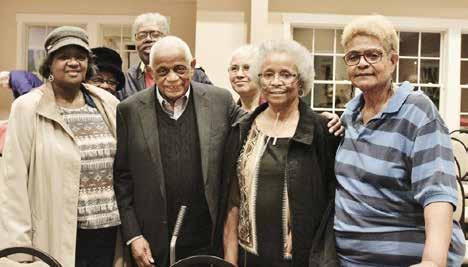
4 minute read
Currents History Symposium
Annual Event Returns To In-Person Format
STORY BY PATRICIA LANGER, PHOTOS CONTRIBUTED
Advertisement
From abolitionists like Harriet Tubman and Frederick Douglass in the 1800s, to modern civil rights leader Martin Luther King, Jr., to cultural trailblazers like Jackie Robinson, BB King and Misty Copeland, African Americans throughout the years have been making personal sacrifices and overcoming challenges in order to affect change in our country. Black History Month (BHM), observed each February in the United States, is a time to recognize African Americans who shaped our culture, and to celebrate achievements that, until recently, have been largely overlooked in our history books. To mark the occasion, the Southport Community Building will serve as host to the 11th annual Brunswick County Black History Symposium from Friday, Feb 17 through Sunday, Feb 19, offering the public a chance to learn about the many contributions of Black citizens in our area.
The origins of Brunswick County’s Black History Symposium date back to 2011, when Southport resident Donnie Joyner and a group of local citizens formed a committee to restore the John N. Smith Cemetery, an African American burial place on E. Leonard Street in Southport. Their efforts evolved quickly and by 2013 had developed into a three-day affair called “Smithfield Township/Southport Black History: The Real Story.” Eventually, it was renamed “The Brunswick County Black History Symposium.”According to Joyner, “The goal is to raise awareness of the civic, economic, and cultural contributions of Black citizens in Brunswick County and to raise money for different groups in need in our area.”
For the last two years, the Symposium was presented through Zoom, which broadened its audience but presented many challenges. This year marks the return to live events and the lineup of speakers and guests is impressive.
Joyner, whose great-grandfather served in the United States Colored Troops during the 1860s, is quite im- pressive himself as a pillar of the community. He serves on the Board of Trustees for Mt. Carmel AME Church, is a member of the Southport Planning Board, the Southport Historical Society, and the NC Maritime Museum. He was also the Public Relations Chairman for the “Celebrating the Dream Program” a five-county program held in 2014 to commemorate the 1964 signing of the Civil Rights Bill.
The three-day Black History Symposium is funded through support from the City of Southport, the Southport Historical Society, the Southport Maritime Museum, and the Brunswick Arts Council, as well as donations from groups and individuals. Each year, whatever money remains unspent is donated to a non-profit or charitable group in Brunswick County. More than $10,000 has been donated since inception. Past recipients have included area churches damaged by Hurricane Florence, the Southport Oak Island Interchurch Fellowship Food Pantry, and New Hope Clinic, a medical center in Boiling Spring Lakes for low-income individuals.
The benefactor of this year’s donations will be Reaves Chapel in Navassa, one of the oldest remaining landmarks of the Gullah Geechee culture in Southeastern NC and an important part of this area’s African American history. Reaves Chapel was built in the late 1800s by a group of formerly enslaved people and operated as a place of worship for the African Methodist Episcopal Church for more than 100 years. Sadly, it was abandoned in 2006 due to its deteriorating condition. Purchased by the Coastal Land Trust in 2019, with funding from the Orton Foundation and the Historic Wilmington Foundation, an effort to restore the building is currently underway, led by the Cedar Hill/West Bank Heritage Foundation.
The 2023 Black History Symposium will kick off with a performance by professional storyteller and actress Carolyn Evans, who will portray “Sojourner

Truth” at 6 pm on Friday, Feb 17, Sojourner, whose given name was Isabella Van Wagener, was born into slavery in 1797 and freed in 1827. She spent the remainder of her life traveling the country as an evangelist, an abolitionist, and a champion for women’s rights. In 1864, she was received at the White House by President Abraham Lincoln and later appointed to the National Freedmen’s Relief Association, where she counseled former slaves on resettlement. Storyteller Evans has performed at historical museums across the country and at the renowned Apollo Theater.
On Saturday, Feb 18, educational exhibits depicting Black history and culture in Brunswick County will be displayed from 11 am to 5 pm at the Southport Community Building. Several presentations highlighting historical events are scheduled as follows:



12 noon: “The 54th Coast Artillery Regiment,” presented by John Mosely, manager of the Southport Maritime Museum.
Mosely, who formerly served as the Assistant Site Manager at the Fort Fisher Museum, became familiar with the 54th while researching WWII at Fort Fisher. In the early 1940s, the United States government disassembled all but one of the coastal artillery units, the 54th, an African American unit based at Camp Da- vis in Holly Ridge, North Carolina. From October of 1941 through January of 1942, the 54th trained with anti-aircraft weaponry at Fort Fisher.

The 54th was renowned for its successes. Enduring personal and political trials during a time of brutal racism, the soldiers of the 54th not only prevailed, they excelled. In a testament to the integrity of their character, the motto of the 54th Regiment became “Through Difficulties,” symbolizing the dual plight of victory at home and victory at war.
“The amazing achievements of these Black soldiers spoke not only to the training they received in the US Army, but also to the founding principles of our nation. They were ordinary people, placed in extraordinary situations, who were able to achieve great things,” said Mosely.
2 pm: “Law and Justice,” presented by District Court Judge Pauline Hankins Judge Hankins grew up on a farm in Bolivia with 12 siblings. She excelled academically and earned a degree in electrical engineering from NC State University before going on to earn her law degree from NC Central School of
Law, cum laude. She was elected to District Court in 2012 and is currently serving her third term. In a poignant twist of fate, Judge Hankins’ great-great grandfather, who was brought to this area as a slave in 1847, worked the same fields that now house the county courthouse where Hankins sits as a highly respected judge.










